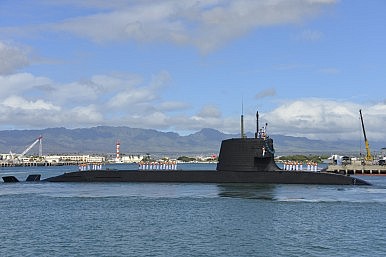
Is the Japanese Soryu-class diesel-electric boat really an option for Taiwan?
Today, the chairman of the U.S. House of Representatives Foreign Affairs Committee, Ed Royce, is beginning a three day visit to Taipei for talks over a wide range of issues, including future arms sales. According to the Taipei Times, arms talks are likely to concentrate on requested U.S. technical aid for domestic submarines.
“Royce is thought to favor helping with the submarines, but without support from U.S. President Barack Obama, the legislators have limited power in this area,” the newspaper notes. In 2001, the Bush administration agreed to help Taiwan acquire or produce eight diesel-electric submarines, yet so far the United States has proven reluctant to fulfill its pledge.
A January 2015 report by Taiwan’s Ministry of National Defense (MND) notes that the United States continues to stall on the request for submarines by stating that it is “still under cross-agency review” by officials. This stalling tactic has been severely criticized by a few former U.S. officials, like Bob Dole, who emphasized that “Taiwan’s greatest need is new submarines.”
As a consequence, Taiwan announced in late December 2014 that it will start building a fleet of its own submarines. Design work is slated to begin in 2016. The project is contracted to take four years. According to media reports, the Republic of China Navy will receive four SSKs . However, with little experience in building submarines, Taipei should expect substantial delays and increased program costs. A prototype of the vessel could be ready by 2o24 with the first ship operational and commissioned one to two years later.
The price per SSK could be up to one billion dollars — especially if the vessels will be equipped with an air independent propulsion system (AIP). European and American shipbuilders will, in all likelihood, help in some yet to be determined capacity, although no American shipyard has built a diesel electric submarine since the 1950s.
A Diplomat contributor recently noted that Japan should perhaps support Taiwan’s indigenous effort — especially if the Australian government opts to buy 10 Japanese Soryu-class diesel-electric boats, as “Taiwan could potentially benefit from the economies of scale created by a combined Australian-Taiwanese order of similar submarines.”
Dean Cheng, a Senior Research Fellow at the conservative Heritage Foundation concurs: “The prospect of Japan engaging in arms sales, and specifically the export of submarines to Australia, raises the possibility of additional, non-traditional suppliers who might be additional sources of either submarine technology, or even completed boats.”
However, IHS Jane’s Defense Weekly quotes a Washington-based expert who noted that,
“Royce is thought to favor helping with the submarines, but without support from U.S. President Barack Obama, the legislators have limited power in this area,” the newspaper notes. In 2001, the Bush administration agreed to help Taiwan acquire or produce eight diesel-electric submarines, yet so far the United States has proven reluctant to fulfill its pledge.
A January 2015 report by Taiwan’s Ministry of National Defense (MND) notes that the United States continues to stall on the request for submarines by stating that it is “still under cross-agency review” by officials. This stalling tactic has been severely criticized by a few former U.S. officials, like Bob Dole, who emphasized that “Taiwan’s greatest need is new submarines.”
As a consequence, Taiwan announced in late December 2014 that it will start building a fleet of its own submarines. Design work is slated to begin in 2016. The project is contracted to take four years. According to media reports, the Republic of China Navy will receive four SSKs . However, with little experience in building submarines, Taipei should expect substantial delays and increased program costs. A prototype of the vessel could be ready by 2o24 with the first ship operational and commissioned one to two years later.
The price per SSK could be up to one billion dollars — especially if the vessels will be equipped with an air independent propulsion system (AIP). European and American shipbuilders will, in all likelihood, help in some yet to be determined capacity, although no American shipyard has built a diesel electric submarine since the 1950s.
A Diplomat contributor recently noted that Japan should perhaps support Taiwan’s indigenous effort — especially if the Australian government opts to buy 10 Japanese Soryu-class diesel-electric boats, as “Taiwan could potentially benefit from the economies of scale created by a combined Australian-Taiwanese order of similar submarines.”
Dean Cheng, a Senior Research Fellow at the conservative Heritage Foundation concurs: “The prospect of Japan engaging in arms sales, and specifically the export of submarines to Australia, raises the possibility of additional, non-traditional suppliers who might be additional sources of either submarine technology, or even completed boats.”
However, IHS Jane’s Defense Weekly quotes a Washington-based expert who noted that,
“[A]s time goes by, it becomes increasingly unlikely that Washington (or any other government) will approve technology transfers for an indigenous submarine program, even assuming that a willing supplier, which doesn’t have business interests in China that precludes such cooperation, exists. For the Obama administration it will be easier to leave this matter for the next administration rather than risk the impact on U.S.-China relations. It will then become crucial for Taiwan to allocate sufficient resources to develop locally what it cannot purchase from overseas.”The Taiwanese Navy currently operates two Hai Lung-class (which is an improved Dutch Zwaardvis-design) submarines and two former U.S. Navy Guppy II-class vessels. The U.S.-built submarines, however, are only used for training purposes.


No comments:
Post a Comment